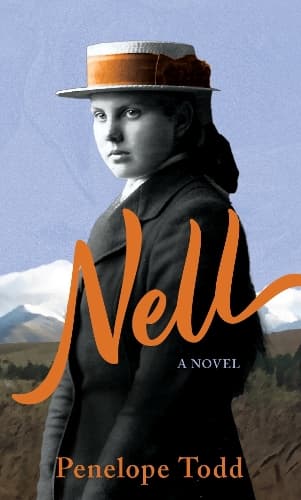Review: Nell, by Penelope Todd
Reviewed by Claire Williamson
In her latest novel, Nell, award-winning writer Penelope Todd (of the Watermark young-adult trilogy, Box and Digging for Spain) evokes the transformative spirit of Aotearoa New Zealand at the turn of the twentieth century through the eyes of her paternal grandmother.
Eleanor Preston – aka Nell – is born in 1897 on a South Island sheep farm homestead. During childhood, her world is the blue mystery of the hills, the sense of accomplishment of moving stock on horseback, of ice skating and cocoa – anything and everything is possible. But soon she has to face the realities of rural life – the winter Nell is 11, a brutal snowfall freezes whole flocks of sheep; when her mother can’t cope, it’s Nell in the kitchen, scraping together a meal to feed a dozen shepherds.
Still, it’s not until Nell reaches her teens that the weight of gendered social norms truly begins to chafe. Despite succeeding and thriving at boarding school, the capable, intelligent Nell is pulled from study early to help out on the farm. Then, post-war, she’s pressured to quit her training as a nurse – which you clearly see would be her vocation – on the whim of her mother. Nell never quite forgives her. Marriage to an aspiring farmer, Herb, seems to offer respite and a comfortable – if not passionate – love, but Nell soon finds the demands and expectations of being a rural wife and mother stifling her dreams and who she might have been.
“She has so many fine thoughts and intentions – to understand, to do good, to improve matters – and most of them seem to evaporate somewhere in the hills or slip down the kitchen drain with the dishwater,” Todd writes. It’s imminently relatable – who hasn’t felt, at one point or another, that the expectations of daily life outweigh the optimism of dreams? You can’t help but root for Nell as she struggles to shape her own path in the world, facing down setbacks and indignations with what can only be described as grit.
And yet, though Nell is clearly the hero(ine) of the book, the other characters in her life aren’t straight villains, either. When Herb sells the high country farm (bought with her “dowry”) to a mercenary landowner without consulting Nell, you know it’s because he’s been having debilitating panic attacks about the economic realities of being in agriculture. Likewise, her mother’s repeated claims of ill health stem from a fear of being abandoned in rural isolation as her children leave the nest. Still, sympathies easily lie with Nell.
Overall, Todd describes Nell as a “‘necklace’ of cameos,” which is a good description of the novel’s flow. Events in Nell’s life unfold chronologically, but not necessarily sequentially; given the book spans over 70 years, Todd glosses over the repetitive to focus on the thematic. It’s an approach also reflected in her deft handling of major global events – both World Wars, the 1918 flu pandemic, Great Depression and Vietnam – which could easily have made Nell feel like an infodump-cum-history lesson. These events touch and shape Nell’s life, of course, but we see their effects through her eyes, ensuring their inclusion feels natural, rather than pedantic.
Todd envelopes you into Nell’s life, and you find yourself admiring the woman she becomes. And, always, there’s a love for the land underpinning the story, evident through Nell’s love of gardening and ability to create a home in the unlikeliest of places. “[Nell] needs her acre of lawn with garden plots to speak for her, to speak back to the hills and sky, whose eloquence she has responded to more deeply with each passing year. The garden, she thinks shyly, is her song of praise.”
Nell conjures up the life of a complex woman, struggling to find her place in an ever-changing world. A novel with depth and dignity.
Reviewed by Claire Williamson
